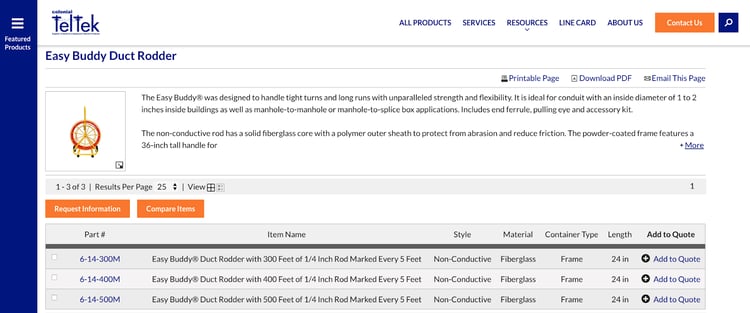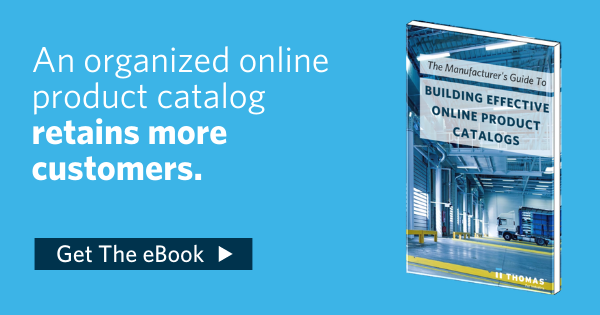How To Plan A New B2B Product Launch With Digital Marketing
Share
Business owners are familiar with building their own go-to-market strategy. It's the official plan of how a new product gets launched, who the target audience is, the marketing plan, and sales strategy. But each product, industry, and market are different — especially in the manufacturing and industrial world. According to a small business survey done by Thomas, only 15.69% of small businesses in the U.S. are using digital marketing as a primary marketing tactic and 30% are still using word-of-mouth. But in the past year, more leaders are making the move to digital transforming their sales and marketing.
The following steps outline how to plan your new B2B product launch with digital marketing and newer, better growth methods that meet a new age of buyers.

4 Step Framework For Manufacturers Planning A Product Launch
1. Research Before You Do Anything Else
It can be easy to focus on the design and manufacturing of your new product and spend less time on research and promotion planning. But lack of preparation before you launch is a big factor that can cause new products to fail.
- According to Harvard Business School, some new 30,000 consumer products are released annually, but as many as 95% of those products fail to make significant sales.
- About 75% of consumer packaged goods and retail products fail to earn even $7.5 million during their first year.
- An analysis of 100 startups that shut down found that 42% didn't solve a valid customer problem
Research for your go-to-market strategy should answer a few things:
- Why you're launching your new product
- Are there any competitors in the market
- Who the new product is for
- What will be your customers' concerns when presented with the product
- How you're going to get people to buy the product
- What are your metrics for success
With a new product, the last thing you want is wasted resources and a surplus of products in your inventory that never gets shipped, so take some time researching the details of the competitive landscape, distribution, audience, and the buying journey. Refer back to your unique selling proposition to help guide you and use the data from your website, Gartner and Forrester, and Thomas WebTrax to make key decisions.
See The Top Industrial Products & Services Being Sourced This Quarter —
Is Yours On The List?
Research also involves testing your product. Run trials with some customers to make sure the differences in your current products will sway new buyers to purchase. This makes sure there's a market for it. Testing for compatibility and performance problems before launch makes sure your product doesn't fall short of claims, because even the slightest issue might have your most loyal customers lose trust in you. Your current customers are key. The more you know about them, the easier it will be to reach new buyers — so keep your customers involved during the development process of your new product.
There's a lot that goes into the preparation for a product launch. Create a product launch roadmap that documents your research findings, key actions, and milestones so you and your teams are fully aligned.
Jump Start Your Research With These B2B Resources:
- The 2021 Industrial Buyer's Search Habits Survey Results
- Q2 Sourcing Activity Snapshot
- The State Of North American Manufacturing 2021 Report

2. Build Your Online Foundation
Many of us are familiar with customer success. We hear it all the time to put the customer first. When it comes to launching a new product, employee engagement is no different from business success. But if you're not engaging your customers and internal staff digitally, you may be missing out on all the advantages that the digital space has to offer.
With the recent surge of the digital space, more and more people are booting up their lives online. Both B2C business and B2B companies alike are taking advantage of selling products online with eCommerce, product catalogs, and digital advertising. Why engage with only a few by word of mouth when you can engage with thousands online?
Related Info: How To Sell Industrial Products In A B2C World
Update Your Website Accordingly
Think of your website like a machine on your shop floor. Would you invest in the latest and greatest technology and let it just sit there on its own? Innovative shop owners know it needs to be finely-tuned and optimized to ensure it's running at peak performance. That's the same concept for your website.
Today, it's essential for manufacturers and industrial companies to leverage a well-organized online product catalog. By offering a catalog, you'll be able to help your buyers better by guiding them through the buyer's journey and it will also provide you another avenue for lead generation.
Incomplete data has always been a common challenge among distributors and OEMs. Don't let it be the cause of your new product launch failure. Buyers can't buy what's not on your website, so before you launch, make sure all your systems are in place and your content is aligned. A seamless online product experience drives more customer sales and enhances your relationship with vendors. And more relevant content on your website boosts your website ranking in Google.
For Colonial TelTek, spreadsheets to manage product inventories are now a thing of the past. They upgraded their website to create a better buying experience for their customers and vendors.

"It’s a win-win. Our vendors love that they can now add more product lines — when we sell more products, they sell more products," said Michael Lynch, VP of Colonial TelTek.
3. Inform Your Teams Throughout Product Development
New product launches don't involve just your sales team and your product experts. Everyone's feedback — especially those outside of marketing, sales, and product — is important to help steer a launch. As you plan, make sure your entire company is in a position to support fast growth. If you don't have a plan to ramp up quickly across all your departments — billing and customer service included — don't be afraid to delay your launch.
Poor support will ruin the customer experience of your new product and company. Make sure your teams are prepared for whatever comes their way with the right online tools. Is your website synced to a customer relationship management (CRM) tool to build and manage customer relationships? How will buyers learn how to use the new product and how will it benefit their customers? People will have questions — make sure your team is well-equipped to answer them and your website has the must-haves to be one of your best salespersons.
Related Resource: How To Improve Your Supplier-Distributor Relationship
Educate your company on relevant parts of your go-to-market strategy including product specs, pricing, and why you're launching something new. Just like your buyers, your employees consume information in different formats. Send out email newsletters, conduct regular product update meetings, and create videos employees can watch on their own time.
Improving your teams' product knowledge boosts your brand's interactions with customers and gives a sense of trustworthiness and competence. Inevitably, this translates to:
- Improved sales
- Faster resolution rate for customer issues
- Better employee retention rate
4. Set Your Product Promotion Plan
There are plenty of cases where a brand new product has no flaws, has nothing else like it in the market, is a perfect fit for customers, but still fails. This is where poor product promotion could be at fault.
Most business owners claim that getting a product in front of customers is easy. But smart marketers know that getting in front of the right customers is the hard part.
See Which Companies Are Searching For The Products You Offer
With A Free Custom In-Market Buyer Report
Thomas has been a worthwhile venture for our company by substantially increasing our brand recognition and allowing those that need the products and services we offer to connect with us in a real way. We are now well known in the region as well as a national marketplace and have been able to secure business that we would never have been considered for in the past.
— Blisterpak, Inc.
The right message should be communicated through the proper channels. Go back to your research and identify where your leads are already engaging and then build strategies to maximize the use of those channels.
Selling a product is not the same as preparing the market to buy your new product. Before your product launch, your promotion should aim to build awareness. Consider launching a full marketing campaign and refer to your research phase about your customer buying journey. Determining how much people know about you before they engage with your product will give you an idea of the type of content marketing you need to reach them.
Take a more proactive approach and investment in the growth of your business. We've seen success for manufacturers and industrial companies that executed a promotion plan with a mix of videos, email marketing, and social media. Did you know that 89% of products are sold after a user watches a video of that product?
Learn more in the case studies below:
- How One Manufacturer Increased Leads By 285% Using Digital Marketing
- Electric Manufacturer Uses Videos & An Online Product Catalog To Get 57% More Online Submissions

When creating your promotion messaging, stick to these tips:
- Highlight advantages the customer cares about. They want a solution to their problem. Limit your content that talks specifically about your company.
- Be truthful. Don't use buzzwords and don't give consumers false perceptions of reality.
- Don't bash your competitors. Steer your content back to value and leverage customer testimonials. People are going to believe what actual customers say over what you say.
- Sell the experience, not the product. When you tell a story, people tend to listen more because their emotions are at play. The power of emotion in marketing works because even if you're selling a B2B model, you're still selling to humans.
Newsletter Advertising To Promote Your Products
Another great way to boost your latest product launch is by including it in industry newsletters. Industry newsletters are a great place to showcase promotional content because it can be targeted to the buyers you're looking to reach and gets sent to potential prospects inboxes on a regular basis.
Thomas has a daily industry newsletter called the Thomas Industry Update. More than 300k subscribers get industry-related news and content daily to stay up to date on current trends in the manufacturing sector. If you currently have an industrial product you'd like to promote, the Thomas Industry Update offers Industrial Newsletter Advertising options, as seen below.
Toagosei’s Aron Alpha branded content received over 73k+ impressions in the Thomas Industry Update that put the brand in front of buyers from major companies including 3M, NASA, and Siemens.
“We knew we wanted to make more buyers and decision-makers aware of what we have to offer," said Mark T of Toagosei America. "The team at Thomas explained the benefits of advertising in the Thomas Industry Update and it ended up being a great way to help us generate that awareness and we earned new contacts for our sales team to call on. We would recommend TIU advertising to other manufacturers and industrial companies who are interested in growing product awareness and business brand.”

A Digital Strategy Is A Must-Have For Product Launches
To avoid product launch failure, it's a must to embrace new technologies internally — not just on your shop floor like with machine learning, AI, and robotics. Planning your strategy before you launch and getting the product to its official launch date is only half the battle. Think about your long-term strategic objectives and how your product will adapt over time to continue meeting customers' needs. If your company isn't in the best position to launch and continue to support prospects and customers, your company will fall behind.
Diversifying your customer base into other industries with your new product will help you stay ahead of competitors. According to a small business survey conducted by Thomas, 28% of manufacturing and industrial companies in the U.S. are planning on launching a new product or service this year — is yours set up for success? A few survey respondents and job shop owners shared some advice:
- “We have a good number of customers in the automotive industry. While I’m not inclined to turn away work, I do try to make sure that 30-40% of our customer base represents non-automotive-related work at any given time.”
- "Items must be readily available for quick shipment or in-stock at the local warehouse for immediate shipment to fulfill 'just in time' inventory management strategies."
- "Proactively see if there are any other products you could supply other than the specific product you may have been asked for. This could include just recommending another aligned or partner company, because product recommendations are strong and valuable. It is a good indicator of how keen you are for business and that you genuinely want to help."
Understanding the needs of your audience is key to your product's success. If your team is limited, competition is fierce, and the need for quality leads is high, contact our team of manufacturing marketing experts to help you accomplish your product launch goals. We've been connecting suppliers to the right buyers for more than 122 years.
Additional Resources To Help Promote Your B2B Products:
- Thomas vs Shopify: What's The Best Product Management Platform?
- How To Sell Industrial Products In A B2C World
- Must-Have Digital Marketing Tools And Apps (Including Free Ones!)
- Case Study: How Colonial TelTek Improved Their Online Product-Selling Experience
- Custom In-Market Buyer Report To See Which Companies Are Searching For The Products You Offer
Or visit our industry-focused articles to learn more about the markets you can break into:
- Challenges And Opportunities In The Aerospace Industry
- Challenges And Opportunities In Private Labeling
- Challenges And Opportunities In Medical Device Manufacturing
- Challenges And Opportunities In Pharmaceutical Manufacturing
- Challenges And Opportunities In Cannabis Industry
- How To Grow Your Steel And Metals Company
- Challenges And Opportunities In The Food And Beverage Industry
- How To Grow Your Textiles Manufacturing Company
- 11 Tips For Growing Your CNC Machining Business
- How Can Private Label Manufacturers Increase Sales




